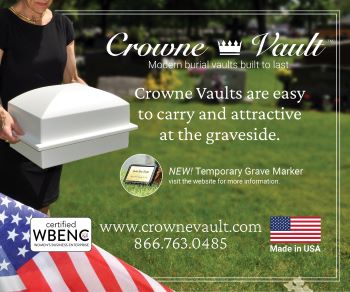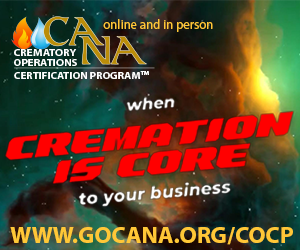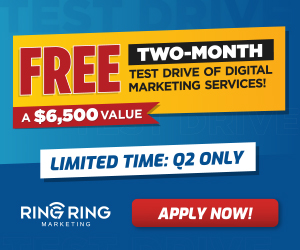How to Resonate with Death-Planning Millennials

This is a Guest Article written by Alexandra Jo, Culture and Content Manager at Parting Stone
*Guest article written by Alexandra Jo, Culture and Content Manager at Parting Stone.
Research shows that across all markets, what today’s consumers find valuable is vastly different than in previous generations. Just like in any other business, understanding consumer trends is an important aspect of planning for your funeral company’s future. Knowing what customers are looking for in both the products and company culture they invest in is an important aspect of building a strong, forward-thinking business strategy.
Much research shows that the millennial and gen z generations look for different qualities when making purchases than baby boomers or gen x-ers. Younger generations are focused on sustainability, quality investments, and minimalism, as opposed to status and luxury symbols. Luckily, changes in consumer values don’t have to be a burden on our businesses. By looking ahead at generational market shifts, we can make smart decisions now about which products to carry and what services to offer, in order to appeal to a wider base of consumers for years to come.
What Products do Millennials Want?
As the workforce and consumer base shift towards younger generations, it’s helpful to be aware of how value is perceived and evaluated among those demographics. Overwhelmingly, research shows that millennial consumers value quality over quantity, and look for solid investments over frilly bells and whistles. Tim Stock, professor of design at Parsons School of Design in New York, notes that, “the Recession left [millennials] acutely aware of the fallacies of finance and the need for sustainability. As a result, there is something more important to this generation than the symbolism of high-cost and luxury: intrinsic value.” Further research shows that millennials, aka “Gen y” are going minimalist, focusing on quality over quantity, and valuing sustainability, thoughtful (often minimalist) design, and long-term investments over gimmicks, trends, or fads:
“Gen Y has been hit harder than other generations by the double whammy of fewer jobs and higher student loan debt. The result is a generation that is more consciously frugal and actively reconsidering the role of material possessions, luxury, sustainability, and career in their lives. The result may be a new Gen y aesthetic, one that prizes minimalism and simplicity over luxury and status in the choice of homes, fashion, technology, travel, and more[…] A more thoughtful approach to spending on luxury and non-discretionary goods is emerging. Shoppers are placing a premium on goods that exhibit qualities of timeliness, usefulness, and versatility. Items that make shoppers feel like they are getting something that will hold its value for the money (rather than something that is going to go out of style next season or has limited, narrow usefulness) will be judged worth the investment. Shoppers also continue to look for goods that are “green” or sustainable and appear to be willing to pay a slight premium for green goods that also deliver a personal economic benefit—e.g., energy-saving light bulbs and appliances.”
According to a research article by IBM Institute for Business Value, the current consumer base as surveyed in 2020 breaks down into four categories: Value-driven Consumers, Purpose-driven Consumers, Brand-driven consumers, and Product-driven consumers. Value driven consumers, or customers who want good value, convenience, and products/services to simplify life and are willing to pay for those benefits., make the biggest group, followed closely by purpose-driven consumers who are willing to pay a premium for products and services that align with their values and lifestyle, and are also willing to change their shopping habits to reduce environmental impact and care about issues such as sustainability and recycling. These two largest groups reflect the growing millennial population in the consumer market.
In the deathcare industry, the Value driven customers are the families choosing direct cremation, planning online, and are most concerned about price. This is a real and valid customer-base, but the race-to-the bottom direct cremation brands are playing a challenging game of market share and volume. If, like most, you’re competing on service rather than price, the segment you want to focus on is the 40% of Purpose Driven Customers.
By focusing on building your services to align with the values of your families, you can both do good for the world and increase profits., An easy place to start is to curate your showroom with urns and caskets that focus on empowering families to support their values while planning a death.
What Services Do Millennials Want?
Research also shows that younger generations are less religious than ever before. An article from the Pew Research Center outlines that “while the U.S. public in general is becoming less religious, the nation’s youngest adults are by many measures much less religious than everyone else. Indeed, one of the most striking findings in the recently released Religious Landscape Study is that Millennials (young adults born between 1981 and 1996) are much less likely than older Americans to pray or attend church regularly or to consider religion an important part of their lives.”
Furthermore, data shows that there is a correlation between religious beliefs and consumer choices when purchasing deathcare goods. This article explains how an individual’s religious beliefs, or lack thereof, weigh on the choices they make, specifically about interment location, caskets, and embalming:
[C]onsumer choices in the marketplace for death goods and services are not solely based on issues of price, status, and availability, but are also heavily influenced by conceptions and understandings of the afterlife, with notions of the afterlife translating into different consumer choices in disposal and interment. Choosing to have a body embalmed, the choice of interment locations and type, including the selection of a particular casket, are not merely consumer choices based on price and availability, but are also deeply intertwined with various understandings of the afterlife, and the views of the body after death. Consumer choices in these cases are often determined by imagined embodiment, and are determined in part by non-rational consumer choices based on religious upbringing and belief. In turn, diasporic and religious identity can be reinforced and solidified through consumer choices that then fulfill religious imaginations of post-death embodiment.
Designing Millennial Friendly Death Care
Understanding the shifting values of consumers allows you to design your funeral home’s experience for the future. Knowing how to appeal to the next generation of funeral consumers who will be making arrangements for their loved ones is vital to building a forward-thinking business that knows how to attract customers and thrive for years to come.
In a demanding profession like deathcare that is steeped in ideals about tradition, these types of changes can seem difficult to implement, whether the challenge is shifting the views of seasoned management, or a fear of changing a traditional business model that is working okay. However, in an interview for the Deathcare Decoded podcast, Ryan Thogmartin, CEO and Founder of Disrupt media and Connecting Directors explains why it’s important for deathcare businesses to evolve in order to meet the needs of a changing consumer base: Ryan says,
“I think it’s the mindset of ‘we’ve always done it this way’ and we get very comfortable with things that we know work. When I give presentations I always say that we are romantic about the things of old because we understood those and we understood what we were going to get as a result of doing certain things. But as the world evolves, as the consumer changes, the consumer isn’t the same as the consumer was 5 years ago, even 10 or 15 years ago, honestly the consumer has changed immensely in the last 12 years because everything else has changed and we evolve very quickly.”
Hear more on this topic from Ryan in this short video clip: https://www.youtube.com/watch?v=MWzQL9rOgYk
It’s valuable for your business to be open to change, especially in today’s market, and especially when seeking to meet the needs of younger death planning demographics. One simple way to appeal to the next generation of death care consumers is to offer more options for planning secular end-of-life celebrations that don’t adhere to traditional religious standards, and getting creative about products that create new or different rituals around death and loss.
More news from the world of Death Care:
- Albertville funeral home customers want prepaid funeral arrangements refunded after business closed. Video story and print article. News 19 – Huntsville (AL)
- Headstones are toppling over at Middletown Cemetery. Who should fix the flooding issue? Middletown Press (CT)
- Memory lawn Cemetery owner promises improvements. Roswell Daily Record (NM)
- Strouf Funeral Home takes care of families as their own. Journal Times. (WI)
Enter your e-mail below t0 join the 2,118 others who receive Funeral Director Daily articles daily:





















Great article. I truly believe the death industry should keep up with current changes and provide more personalized service to potential clients.